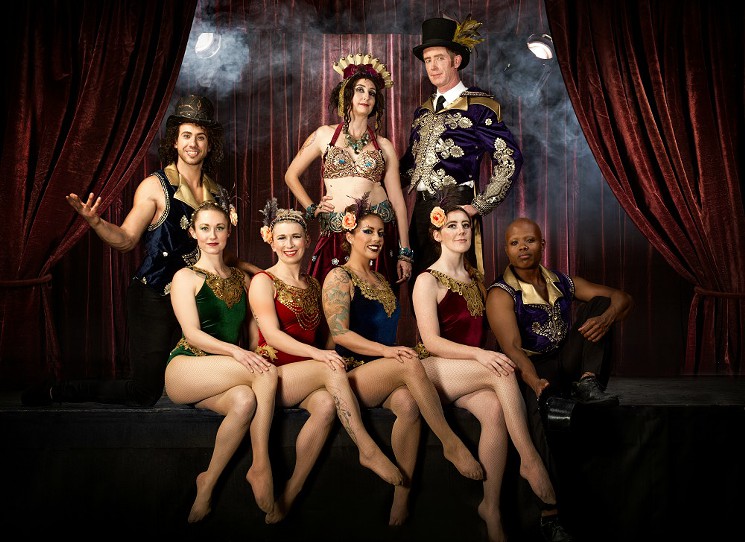From Hurricane Katrina to the Great Recession: Out of adversity comes art

Natalie Brown received a South Carolina Arts Commission Artists’ Ventures Initiative grant in 2011.
From Westwood.com
Article by Ana Campbell, photos by Scott Bilby
Often it is the case that from bad comes good. For Natalie Brown, it took a few slipped discs, a natural disaster, the untimely death of a loved one and the Great Recession to find her calling: the Phantom Circus, the performance group she founded that will debut at the Oriental Theater this month.
Brown starts her story after college, when a genetic disease left the lifelong ballerina with a nearly broken back. With rehab in mind, she found a less grueling creative outlet in tribal-style belly dancing. She was practicing and performing with a group in New Orleans when Hurricane Katrina hit, forcing Brown and her then-partner out of Louisiana. They found a home in Columbia, South Carolina, where Brown’s family was living.
Nobody was doing tribal-style belly dancing in South Carolina at the time, so Brown decided to open a dance company that specialized in it.
“If I can make art, then I’m okay,” she says.
Brown found the one “alt watering hole” in the sleepy Southern town and became friendly with the owners – so friendly that they let Brown and her belly-dancing troupe perform in the bar’s parking lot once a month.
The belly-dancing performances were just that until Brown decided to expand. She started looking into underground circuses, which were becoming more mainstream, particularly after several toured and found fame with the band Panic! at the Disco.
Brown found a single mom living in the suburbs with a talent for hula-hooping and a fire performer who, as Brown tells it, “wouldn’t burn the place down,” and started Alternacirque in 2007.
Just as the circus was picking up steam, Brown got word that her father had terminal cancer. He died shortly thereafter. “Once again, something bad happened, so I turned to art,” she says. A year later, in 2008, the economy tanked.
But for once, bad luck was on Brown’s side. “No one had money to do anything at all,” she explains. “Word got out that there was this free show in the parking lot.” Before Brown knew it, the audience at her bar shows had grown from fifty people to 500.
The show continued to grow and change – mostly through Kickstarter campaigns and self-taught performance pieces – until the performers decided to part ways in 2013. Brown used her newfound downtime to improve her performance art. She moved to Boulder to train with a renowned belly-dancing professor at the University of Colorado and eventually enrolled in Frequent Flyers, an aerial-dance studio in Boulder.
As much as Brown loves performing and the arts, she also loves the business behind it, which she learned a lot about in South Carolina. A succession of conservative governors had slashed arts funding, so the state’s arts commission told performers not to rely on anyone but themselves, Brown says: “They kept telling artists in South Carolina, ‘Look, the salary is not coming; nobody’s going to rescue you. You need to be self-sufficient, self-sustaining, learn the business and be entrepreneurs and artists.'”
Once Brown finished at Frequent Flyers, where she also got professional business training in about nine months, she started thinking about running her own circus again. While she was formulating a business plan, she started interning at a company that taught her how to book corporate events. She married her passions and started the Phantom Circus, which until recently specialized in aerial bartending. “Imagine your guests walking into a ballroom greeted with the sight of aerialists hanging from a chandelier pouring champagne,” explains the Phantom Circus’s website. “A stilt-walker wanders by and pours a signature cocktail. A contortionist performs on a table and hands out wine glasses.”
Brown will premiere the strictly performance side of Phantom Circus on September 15 at the Oriental Theater. “We’re doing this as variety-show style,” she says. The all-ages show will feature belly dancing, acrobatics, hula-hooping and fire and aerial performers. Brown’s romantic partner, Steve Millin, will serve as the ringmaster.
Denver is hardly known for its underground-circus scene, Brown notes. “But I think there is a desire in the community for us to make our mark and to help each other and get better and build something really, really unique,” she concludes.


